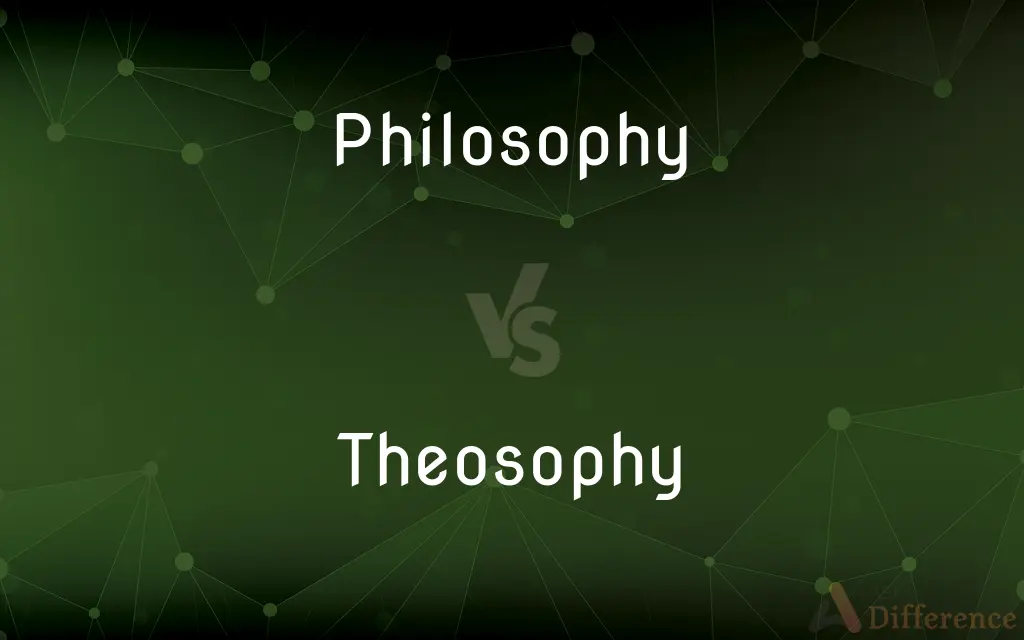Philosophy vs. Theosophy — What's the Difference?
By Tayyaba Rehman — Published on November 8, 2023
Philosophy is the study of fundamental questions about existence, knowledge, and ethics. Theosophy is a mystical religious doctrine aiming to understand divine wisdom, often through spiritual intuition.

Difference Between Philosophy and Theosophy
Table of Contents
ADVERTISEMENT
Key Differences
Philosophy and Theosophy are terms rooted in the pursuit of knowledge, but they differ significantly in approach and subject. Philosophy is a broad discipline that seeks to understand and address fundamental questions about existence, knowledge, values, reason, mind, and language. Derived from the Greek word 'philosophia', it literally means "love of wisdom". Through logical reasoning and questioning, philosophers attempt to uncover truths about the world and human experience.
On the other hand, Theosophy is a specific spiritual movement that emphasizes the direct knowledge of God or the divine. The term "Theosophy" combines the Greek words for 'god' and 'wisdom', suggesting "wisdom of the divine". Theosophy believes that humans can access hidden knowledge or truths about the universe and the divine through intuition and spiritual insight, bypassing conventional empirical or logical methods.
While Philosophy uses reason, argumentation, and empirical evidence to understand reality, Theosophy leans more towards mysticism, asserting that spiritual practices can reveal divine wisdom. Philosophy is more secular and relies heavily on critical thinking and dialogue, whereas Theosophy intertwines religious and esoteric beliefs, emphasizing spiritual elevation.
Both Philosophy and Theosophy seek truth, but they approach this quest from different angles. While the former is grounded in reason and critical thinking, the latter delves into the mystical, believing in the possibility of directly accessing divine wisdom.
Comparison Chart
Nature
Academic discipline
Mystical religious doctrine
ADVERTISEMENT
Origin of Term
Greek: 'Love of wisdom'
Greek: 'Wisdom of the divine'
Method of Understanding
Reason, argumentation, empirical evidence
Intuition, spiritual insight
Main Focus
Existence, knowledge, values, reason, mind, language
Direct knowledge of God or the divine
Association
Secular, spans various schools of thought
Religious, esoteric, linked to spiritual practices
Compare with Definitions
Philosophy
The study of fundamental questions about existence and knowledge.
Philosophy challenges us to think deeply about the world.
Theosophy
Mystical religious teachings about divine wisdom.
Theosophy emphasizes spiritual evolution and reincarnation.
Philosophy
A system of beliefs or principles.
His life was guided by a personal philosophy of kindness.
Theosophy
Esoteric wisdom based on mystical insights.
The writings on Theosophy provide guidance on spiritual growth.
Philosophy
A particular system of thought or doctrine.
Stoicism is an ancient Greek philosophy.
Theosophy
A doctrine of spiritual intuition and revelation.
The adherents of Theosophy seek a deeper understanding of the divine.
Philosophy
Critical examination of our beliefs and actions.
Through philosophy, she questioned her previously held assumptions.
Theosophy
The belief in obtaining direct knowledge of God.
Through meditation, she practiced Theosophy to connect with the divine.
Philosophy
The study of the nature, causes, or principles of reality, knowledge, or values, based on logical reasoning.
Theosophy
Religious philosophy or speculation about the nature of the soul based on mystical insight into the nature of God.
Philosophy
A system of thought based on or involving such study
The philosophy of Hume.
Theosophy
Often Theosophy The system of beliefs and teachings of the Theosophical Society, founded in New York City in 1875, incorporating aspects of Buddhism and Brahmanism, especially the belief in reincarnation and spiritual evolution.
Philosophy
The study of the theoretical underpinnings of a particular field or discipline
The philosophy of history.
Theosophy
Any doctrine of religious philosophy and mysticism claiming that knowledge of God can be attained through mystical insight and spiritual ecstasy, and that direct communication with the transcendent world is possible.
Philosophy
An underlying theory or set of ideas relating to a particular field of activity or to life as a whole
An original philosophy of advertising.
An unusual philosophy of life.
Theosophy
(religion) Any system which claims to attain communication with God and superior spirits by physical processes.
Philosophy
The love of wisdom.
Theosophy
The system of beliefs and doctrines of the Theosophical Society.
Philosophy
(uncountable) An academic discipline that seeks truth through reasoning rather than empiricism.
Philosophy is often divided into five major branches: logic, metaphysics, epistemology, ethics and aesthetics.
Theosophy
Any system of philosophy or mysticism which proposes to attain intercourse with God and superior spirits, and consequent superhuman knowledge, by physical processes, as by the theurgic operations of some ancient Platonists, or by the chemical processes of the German fire philosophers; also, a direct, as distinguished from a revealed, knowledge of God, supposed to be attained by extraordinary illumination; especially, a direct insight into the processes of the divine mind, and the interior relations of the divine nature.
Philosophy
(countable) A comprehensive system of belief.
Theosophy
Belief based on mystical insight into the nature of God and the soul
Philosophy
(countable) A view or outlook regarding fundamental principles underlying some domain.
A philosophy of government;
A philosophy of education
Theosophy
A spiritual movement combining Eastern and Western religious ideas.
Theosophy integrates teachings from Buddhism, Hinduism, and Christianity.
Philosophy
(countable) A general principle (usually moral).
Philosophy
(archaic) A broader branch of (non-applied) science.
Philosophy
A calm and thoughtful demeanor; calmness of temper.
Philosophy
Synonym of small pica.
Philosophy
To philosophize.
Philosophy
Literally, the love of, inducing the search after, wisdom; in actual usage, the knowledge of phenomena as explained by, and resolved into, causes and reasons, powers and laws.
Philosophy
A particular philosophical system or theory; the hypothesis by which particular phenomena are explained.
[Books] of Aristotle and his philosophie.
We shall in vain interpret their words by the notions of our philosophy and the doctrines in our school.
Philosophy
Practical wisdom; calmness of temper and judgment; equanimity; fortitude; stoicism; as, to meet misfortune with philosophy.
Then had he spent all his philosophy.
Philosophy
Reasoning; argumentation.
Of good and evil much they argued then, . . . Vain wisdom all, and false philosophy.
Philosophy
The course of sciences read in the schools.
Philosophy
A treatise on philosophy.
Philosophy
A belief (or system of beliefs) accepted as authoritative by some group or school
Philosophy
The rational investigation of questions about existence and knowledge and ethics
Philosophy
Any personal belief about how to live or how to deal with a situation;
Self-indulgence was his only philosophy
My father's philosophy of child-rearing was to let mother do it
Philosophy
Inquiry into the nature and purpose of life.
Many turn to philosophy in search of life's meaning.
Common Curiosities
Why do people study Philosophy?
People study Philosophy to understand life's fundamental questions, challenge their beliefs, and develop critical thinking skills.
What is Philosophy?
Philosophy is the study of fundamental questions about existence, knowledge, values, and more, often using reason and argumentation.
Is Theosophy a religion?
Theosophy has religious elements, emphasizing mystical teachings and spiritual practices, but it's more of a spiritual doctrine than a traditional religion.
Who are some famous philosophers?
Plato, Aristotle, Immanuel Kant, and Friedrich Nietzsche are among many renowned philosophers.
What are the core teachings of Theosophy?
Theosophy emphasizes spiritual evolution, reincarnation, karma, and the direct knowledge of God or the divine.
How does Theosophy differ from Philosophy?
Theosophy is a mystical religious doctrine aiming for direct knowledge of the divine, often through intuition, while Philosophy seeks understanding through reason and critical thinking.
Can anyone study Philosophy?
Yes, Philosophy is accessible to anyone willing to engage in critical thinking and explore profound questions.
Share Your Discovery

Previous Comparison
Domestic Flight vs. International Flight
Next Comparison
Flash Drives vs. Hard DrivesAuthor Spotlight
Written by
Tayyaba RehmanTayyaba Rehman is a distinguished writer, currently serving as a primary contributor to askdifference.com. As a researcher in semantics and etymology, Tayyaba's passion for the complexity of languages and their distinctions has found a perfect home on the platform. Tayyaba delves into the intricacies of language, distinguishing between commonly confused words and phrases, thereby providing clarity for readers worldwide.













































